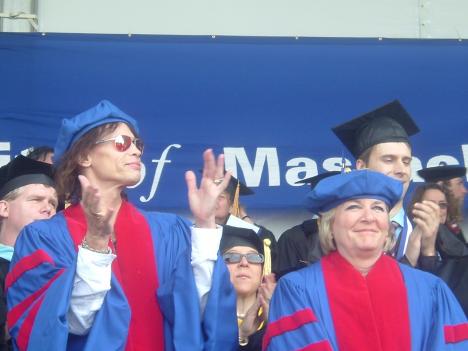A Baseball Diamond In the Rough
April 7, 2005
Merely 27 hours and 33 minutes before the 2005 home opener of the UMass Boston baseball team on March 31, David Roberts, intercollegiate coordinator of the Department of Athletics, was still on the move to find an available venue for the game against Johnson and Wales University.
His toil might sound a little odd to those who have been steeped in a century-old coupling of the Red Sox and Fenway Park, but it’s nothing new for teams without their own fields like UMB.
Roberts finally found his relief when a coach of Johnson and Wales made an arrangement to use a field at Providence, RI, which is more closely located to the Wild Cats than to the hosting Beacons. The game started at six in the evening, three hours later than originally scheduled.
Without any other choice, UMB drove about three hours for a return trip to play a “home” game at a field that players had almost no prior knowledge of, yet somehow batting in the bottom of each inning in a 6-3 loss.
For the nomadic Beacons, who despite the ordeal have the third best winning percentage in UMB’s 12 varsity teams, Roberts said he does his best looking out over the six states in New England for any baseball field open, drawing from a limited pool of diamonds that are spacious and well-maintained enough for college-level competitions. He recalls that UMB has played its home games at Babson College, Tufts University, UMass Dartmouth, and other institutions.
“[UMass Dartmouth and some other colleges] understand our situations very well and have been very good to us,” commented Roberts. “You have to use relationships built up for a number of years.”
Among five institutions in the Commonwealth’s university system, UMB is the only school with a baseball team, and the only one without a field. UMass Dartmouth, belonging to the same Division III Little East Conference, has a gorgeous facility with grass on both infield and outfield, as well as an electric bulletin board.
It is the team that carries all the burdens. Stripped of any home-field advantage, the Beacons in many cases have no clue as to decisive information necessary in the sport, such as the condition and dimensions of a field and wind direction, until they get to the practice about an hour or two before games.
“It is much easier for pitchers to pitch on the mound they know,” one player said on the way to an improvised batting cage in the gymnasium at Clark Athletic Center on a sunny day.
“[Conditions of fields we have played] were sometimes bad,” added another player on condition of anonymity. “I don’t think the department is doing a good job in this.”
The Department of Athletics considers borrowing two overlapping baseball fields at neighboring Boston College High School as the best option possible due to its proximity. Pat Burns, Interim Director of Athletics and Recreation, emphasized on strong ties between the department and BC High, which benefits from UMB when high school athletes come to campus to practice at a swimming pool and an ice rink.
The same courtesy, however, is difficult to carry over to the sport of baseball. More than half of the baseball games for both varsity teams take place concurrently, in addition to that UMB and a total of three BC High teams (varsity, junior varsity and freshmen) are vying for a pair of fields.
A college baseball season starts in the last week of March and continues until the first week of May. The BC High Eagles also spend the whole April and May playing 20 games, hosting eight of them. Even when their varsity teams play an away game, junior varsity and freshmen might need a place to practice or play scrimmages. To make matters worse, UMB’s home games on weekdays are scheduled at 3 and 3:30 p.m., exactly when the Eagles scoot out after classes.
As a result of these various conflicts, last year the Beacons were able to play only one home game out of seven at BC High.
“For the last couple of years, we didn’t have anything available up there,” Burns commented. “But BC High has first priority on the field because it is their field.”
Burns recalled that the university discussed 15 years ago an option to build a baseball field on campus. Today the department keeps putting the issue on the table for the Master Plan, which aims to develop infrastructure at UMB. But such a breakthrough doesn’t sound realistic any more after most of the vacant land has been turned into a Campus Center and parking lots.
The Beacons are scheduled to play six more home games this season. One of them has a secured location at Babson College in Wellesley, MA.





















































